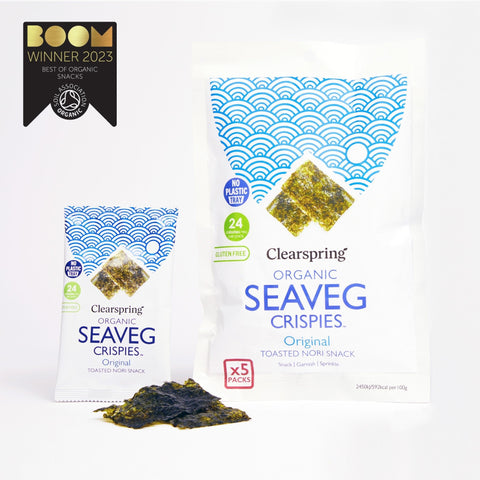FREE UK MAINLAND DELIVERY ON ORDERS OVER £55
Organic Vs Non-Organic Seaweed / Sea Vegetables. What's the difference?

Ever wondered what the difference between organic and non-organic seaweed is? Or more specifically Sea Vegetables, which are the varieties of seaweed which grow in the ocean and can be eaten. We had a chat with Alison Muirhead at the Soil Association Certification, the UK’s biggest organic certifier to find out.
Can you tell me, briefly, a little about you and what the Soil Association is?
The Soil Association is the UK’s oldest certifier – last year was our 50th year of certifying! We offer a range of organic and sustainable certification schemes across food, farming, forestry, beauty & wellbeing, fashion & textiles and catering. The Soil Association is also a charity that campaigns to transform the way we eat, farm and care for our natural world – the certification side of the business also part funds the charity! I work on the food and drink side of the certification business and focus on organic online and organic aquaculture.
Is there a difference between organic and non-organic seaweed?
There are differences between organic and non-organic seaweed. There are no artificial fertilisers used to start the seaweed seedlings off, organic seaweed can only use naturally derived fertilisers and then only use natural nutrients that are available in the marine environment. There are also rules around where the seaweed farms can be sited (away from pollutants) and how much seaweed can be gathered if it’s wild harvested. There’s a big emphasis on protecting the marine environment and promoting biodiversity in organic standards.
Is certifying seaweed the same as certifying any other product i.e. fruit, oils, biscuits, or vegetables?
Seaweed can be cultivated or wild harvested, so it’s quite a unique product! It’s similar to other farmed products, in that we visit the site and processing facilities, but it’s unusual as it spans farming, wild harvesting and aquaculture.
In terms of the certification, it’s just the same! We have to ensure that all the links in the chains are properly inspected and certified, from the farmer, to the processor of the products and also anyone storing or distributing the products. When you see the Soil Association symbol on a packet, you can be assured that all ingredients have been inspected to ensure that businesses are wholly organic.
How is organic seaweed sourced?
Seaweed is usually either grown on ropes out at sea or wild harvested (native seaweeds that wash up on the shore). It can be grown all over the world, but some countries produce more than others.
How do you check and monitor that certified seaweed is in fact organic?
We visit the site that the seaweed is grown/harvested once a year (if grown in the UK) or make sure that we’re working with properly accredited certification partners and have many checks in place to make sure that every link in the chain is properly inspected.
Does all seaweed, whichever part of the world it comes from, have to meet the same organic standard?
Soil Association ensures that any product we certify has an equivalent certification in its country of origin. This is essential to make sure the Soil Association logo delivers quality and trust.
How easy is it to find organic seaweed?
Organic seaweed is pretty easy to find in supermarkets, independent retailers and online now, which is brilliant!
Is there a taste and quality difference with organic vs non-organic seaweed? If so why?
Taste is a bit subjective, but a lot of thought and care is put into choosing an organic seaweed site and processing of the seaweed is kept to a minimum, with all processing adhering to strict organic guidelines. This often translates to a delicious, high-quality product!
How easy is it to swap organic seaweed into your diet?
Seaweed is an easy swap, whether its snacking or seasoning, it adds a delicious umami note and is a very easy way to add in nutrition.
What does it mean to be certified organic by the Soil Association?
It’s not easy to achieve organic certification with the Soil Association. Standards are stringent and it takes a very committed company to see the process through – but we also believe that there are great benefits. Customers recognise the quality and the environmental benefits.
Guest

Alison Muirhead Business Development Manager at the Soil Association Certification, the UK’s biggest organic certifier
More information: Soil Association
Discover Clearspring's Sea Vegetable Range



